Embsay and Bolton Abbey Steam Railway
The Embsay & Bolton Abbey Steam Railway (E&BASR) is a heritage railway in North Yorkshire, England, formed in 1979 and opened in 1981.
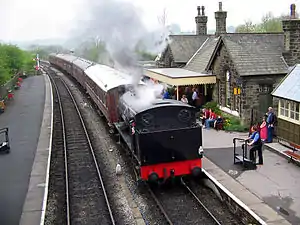 Embsay station | |
| Locale | Embsay, North Yorkshire, England |
| Terminus | Embsay |
| Commercial operations | |
| Name | Skipton to Ilkley Line |
| Built by | Midland Railway |
| Original gauge | 4 ft 8 1⁄2 in (1,435 mm) standard gauge |
| Preserved operations | |
| Operated by | Embsay and Bolton Abbey Steam Railway |
| Stations | 3 |
| Length | 4 miles (6 km) |
| Preserved gauge | 4 ft 8 1⁄2 in (1,435 mm) standard gauge |
| Commercial history | |
| Opened | 1888 |
| Closed | 1965 |
| Preservation history | |
| 1968 | Railway Preservation Society formed |
| 1979 | Embsay railway station re-opened |
| 1981 | Railway line re-opens officially |
| 1982 | DMU special operated Skipton to Embsay (prior to Embsay JCT removal) |
| 1986 | Embsay railway station (then footbridgeless) appeared in Yorkshire Television sitcom In Loving Memory. |
| 1987 | Holywell Halt opens |
| 1988 | Embsay railway station celebrated 100 years of the station itself. |
| 1991 | Heritage line re-opens to and Stoneacre opens. |
| 1995 | Price & Ownership for Bolton Abbey extension project agreed. |
| 1997 | Trains return to Bolton Abbey |
| 1998 | Bolton Abbey railway station re-opens officially. |
| 1999 | Heritage Railway awarded in National Railway Heritage Awards. |
| 2011 | E&BASR Granted by Heritage Lottery Fund to and for electric autocar restoration |
| Headquarters | Embsay |
| Embsay & Bolton Abbey Steam Railway | |||||||||||||||||||||||||||||||||||||||||||||||||||||||||||||||||||||||||||||||||||||||||||||||
|---|---|---|---|---|---|---|---|---|---|---|---|---|---|---|---|---|---|---|---|---|---|---|---|---|---|---|---|---|---|---|---|---|---|---|---|---|---|---|---|---|---|---|---|---|---|---|---|---|---|---|---|---|---|---|---|---|---|---|---|---|---|---|---|---|---|---|---|---|---|---|---|---|---|---|---|---|---|---|---|---|---|---|---|---|---|---|---|---|---|---|---|---|---|---|---|
| |||||||||||||||||||||||||||||||||||||||||||||||||||||||||||||||||||||||||||||||||||||||||||||||
The preserved railway was part of the former Midland Railway route from Skipton to Ilkley which was closed down by British Railways in 1965 over 15 years before the reopening of part of the line.
The E&BASR currently runs for a total distance of 4 miles (6 km) from Embsay via Draughton Sidings, Holywell and Stoneacre Loop to Bolton Abbey station and carries around 100,000 passengers a year.[1]
The long-term objectives of the railway are extensions of the line in both directions, eastwards to the West Yorkshire village of Addingham and southwest towards the North Yorkshire market town of Skipton.[2][3]
Overview
The rolling stock on the line consists of 20 ex-industrial locomotives, the oldest of which was built in 1908, three diesel-multiple units, and ten other diesel locomotives. The railway hold an annual gala Branchline Weekend.
Embsay railway station was built in 1888. Bolton Abbey village is named after the nearby 12th century Bolton Priory, belonging to the Dukes of Devonshire.
The route was formerly part of the Midland Railway line that connected Skipton and Ilkley via Addingham. The line was shut down by British Railways in 1965 and was left to fall in disrepair. Around 14 years after closure, a group of volunteers put forward a plan in 1979 to reopen the line as a preservation route. This plan went ahead and Embsay railway station was refurbished throughout the second half of the 1970s and reopened in 1981.
To the west of Embsay station, a run-round loop for locomotives was built near the site of the former Embsay Junction, which was disconnected when the line closed.
By 1987 further extensions brought the line to a newly constructed halt at Holywell and later to Stoneacre Loop. Bolton Abbey railway station finally reopened in 1998, bringing the current total of over 4 miles in length.
Expansion plans
Extension to Addingham and Ilkley
As the original line stretched from the North Yorkshire market town of Skipton to the West Yorkshire spa town of Ilkley, there was talk of extending the re-opened track to cover the original extent prior to its closure by British Railways in 1965.
Taking the line to Addingham and re-opening Addingham is often mentioned as a potential project but the line's owners have stated that they intend to consolidate the current route instead.[4]
An extension to Addingham would be a huge project, and would involve a near-doubling of the line's current length. Previous extensions have been built in small sections over a long period of time, so a re-opening of the line to Addingham would be many years off.
Reports suggest Sustrans are interested in converting the route into a cycle path, but would provide formation space for a single track allowing any extension to be built.[5]
The Addingham extension could start off as an extension to a possible halt Wharfe Riverside located near the hamlet of Bolton Bridge), before Addingham could be considered officially.
The embankment supporting Addingham railway station, goods yard and depot was removed and replaced in the 1980s with a housing development, with the bridge and abutments over the main road demolished at around the same time.
There are plans to rebuild one of the bridge abutments at the end of the surviving embankment to the north as part of the Addingham Project which also involves constructing a replica LMS style station, goods yard and depot on the extra land next to and at the edge of the embankment.
These would be over the main road from the now defunct former station and goods depot. Funds would need to be collected for 10 to 15 years before any project of this extent could be realised.
Much of the route between Addingham and Ilkley has been re-developed since abandonment. Cuttings have been filled in and Ilkley viaduct was demolished in 1973, six years before the E&BASR re-opened.
The Skipton platforms at Ilkley station now form the station's car park, and there has been significant building development in Ilkley town centre on the former trackbed. Therefore, it is unlikely that this section will be reinstated as preserving the whole line between Ilkley and Skipton was considered too expensive.
Connection to Skipton station
There is currently no link between the Heritage line and the Network Rail branch line to Swinden Quarry (the former Yorkshire Dales Railway), the points at this site having been dismantled. Re-instating this link would allow trains to serve Skipton station, and would potentially offer greater access to the railway.[6]
The platforms at Skipton (5 & 6) that served the Ilkley route were made redundant in 1965. If this link were reinstated these platforms would require a rebuild as they have been disused for a very long time.
In 1982 there were plans to extend the line to Skipton, as a special DMU service was running at the time. Because British Rail still used the section between the two stations for its operations to Swinden Quarry (this section of the old branch line to Grassington was and is still part of the rail network), plans were dropped, stating that operating as far as Skipton whilst sharing the line with the goods operation was too problematic.
Network Rail has carried out a survey for the reinstatement of the connecting points between the Heritage line at Embsay and the freight line to Rylstone, and the reinstatement of the two platforms 5 and 6 at Skipton. The cost has been estimated to be between £1.1 million and £2.6 million.[6] If funding is made available, then the line could be extended.[7] JMP Consulting has been commissioned to develop a business case for the project.[6]
Media appearances
In 1986 Embsay railway station which had no footbridge at that time appeared in an episode of the final series of the Yorkshire Television sitcom In Loving Memory as the fictional Oldshaw railway station, in which Ernie Hadfield (Colin Farrell) accidentally led the group on a short cut over the track, resulting in a coffin becoming stuck on the trackbed, which is then crushed by an oncoming train, carrying the deceased from the coffin in front.
The railway was also the filming location of an episode of Emmerdale (also a Yorkshire Television programme). In the episode, Embsay station was made to look like the fictional Hotten station. Many of the well-known characters from the show were at the filming. The episode was filmed in December 2004.[8]
The railway has also appeared on the BBC Television documentary programme Great British Railway Journeys presented by Michael Portillo.
Since 2018-9, the E&BASR has become the location, used for the Live-Action web-series Storytime with Mr. Evans, featuring actor (and former Thomas & Friends narrator) Mark Moraghan who plays the title character.
The route of the E&BASR
The line runs through the countryside of the Yorkshire Dales in the county council area of North Yorkshire.
The railway has helped and supported the surrounding area (and local economy) to regenerate and provide brand new attractions, boosting both trade and tourism.
- Skipton platforms 5 & 6 (proposed). One of two long-term objectives (since 2000), the proposed northern terminus of the line to interchange with Northern train services on the nearby Airedale Line.
- Haw Bank Tunnel. The 220yd long railway tunnel, located en route between Skipton station and Embsay Junction.
- Embsay Junction. Located close to Embsay station and connects to the Rylstone line (section of the former Grassington Branch).
- Embsay. Re-opened in 1981, restored to its former LMS condition. The current terminus of the line. Facilities include booking office, waiting room, toilets and souvenir shop.
- Draughton (proposed). In the old days of the Midland (later LMS) Railway, there were once plans to build a little halt called Draughton, at the siding, "marking where it was to be built but never had".
- Holywell. Opened in 1987 to view Craven Fault.
- Stoneacre. Former run-round loop en route along the line, now used as a passing loop for use during two train operation.
- Bolton Abbey. Current terminus of the line. Facilities include booking office, waiting room, toilets, a souvenir shop and tearoom
- Addingham (proposed). One of two long-term objectives. The original railway station and goods site have long since been demolished and redeveloped, although the trackbed between Bolton Abbey and Addingham still exists.
Steam Locomotives
The railway has a large collection of industrial steam engines and Austerity tanks and also some locos from the Big Four (British railway companies).
Operational Steam Locomotives
| Origin | Number/Name | Wheel arrangement |
Class | Notes | Photograph |
|---|---|---|---|---|---|
| Hunslet | 2705 Beatrice | 0-6-0ST | Built in 1945. Returned to steam in 2020 after a ten-yearly overhaul. | .jpg.webp) | |
| Hudswell Clarke | 1208 Illingworth | 0-6-0ST | Restoration completed May 2017 in time for the "Classic Transport" gala. | ||
Visitors/On Loan
| Origin | Number/Name | Wheel arrangement |
Class | Notes | Photograph |
|---|---|---|---|---|---|
| Hunslet class | 3794 Cumbria | 0-6-0ST | Austerity | Built in 1953. Owned by the Furness Railway Trust and on loan from the Ribble Steam Railway. | .jpg.webp) |
Locos under overhaul or restoration
| Origin | Number/Name | Wheel arrangement |
Class | Notes | Photograph |
|---|---|---|---|---|---|
| Andrew Barclay | 22 (Works No. 2320) | 0-4-0ST | Built in 1952. The frames are complete, a new tank has also been made and fitted. The boiler was successfully steam tested and fitted into the frames in November 2020, and has also had a new firebox fitted. | ||
| Hunslet | No S121 "Primrose (Works No. 3715) | 0-6-0ST | Standard 16 inch Hunslet | Built in 1952. Under overhaul. The boiler has had a new firebox fitted but the frames require more work than previously thought not much happening recently. | 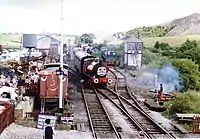 |
| Hunslet | S134 Wheldale (Works No. 3168) | 0-6-0ST | Austerity class | Built in 1944. Undergoing overhaul following a fund raising campaign. Chassis being overhauled at Statfold. | 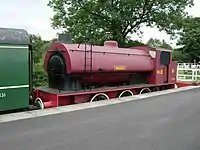 |
| Sentinel | Ann (Works No. 7232) | 0-4-0VBT | Built in 1927. Undergoing overhaul at the East Lancashire Railway. | .jpg.webp) |
Stored
| Origin | Number/Name | Wheel arrangement |
Class | Notes | Photograph |
|---|---|---|---|---|---|
| Hunslet | 1 Monkton (Works No. 3788) | 0-6-0ST | Austerity class | Built in 1953. Withdrawn 2009, requires new inner firebox. | .jpg.webp) |
| Hudswell Clarke | Thomas (Works No. 1450) | 0-6-0T | Built in 1922. Awaiting overhaul, withdrawn August 2010. | 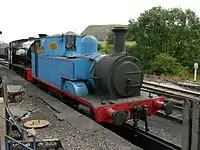 | |
| Hudswell Clarke | 140 (Works No. 1821) | 0-6-0T | Built in 1948. Withdrawn in 2008. | 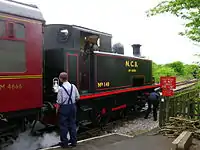 | |
| RSH | 2 | 0-4-0ST | Awaiting major restoration but there are plans for it to have one once work has been completed on other locomotives first. | ||
| Hudswell Clarke | 5 Slough Estates | 0-6-0ST | Built in 1939. Stored undercover in the engine shed. | ||
| Hunslet | Airedale (Works No. 1440) | 0-6-0ST | Standard 15 inch Hunslet | Built in 1923. Stored awaiting restoration. A new bunker has already been constructed. |
Diesel Locomotives
Operational Diesel Locomotives
| Origin | Number/Name | Wheel arrangement |
Class | Notes | Photograph |
|---|---|---|---|---|---|
| Ruston & Hornsby | 887 | 4wDM | Operational. | 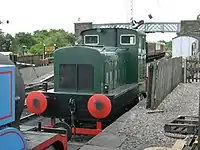 | |
| Hudswell Clarke | 36 | 0-6-0 | Operational and is the main locomotive shed shunter at Embsay. | ||
| Vulcan Drewry | D2203 | 0-6-0DM | Class 04 | Operational. | |
| BR | D3941/08773 | 0-6-0DE | Class 08 | Operational. | .jpg.webp) |
| BR | D9513 | 0-6-0DH | Class 14 | Operational and mainly works as a standby engine and on passenger trains. | .jpg.webp) |
| BR | 37294 | Co'Co | Class 37 | Operational and used on passenger trains. |
Undergoing repair, overhaul or restoration
| Origin | Number/Name | Wheel arrangement |
Class/Type | Notes | Photograph |
|---|---|---|---|---|---|
| Andrew Barclay | 2 Meaford | 0-4-0DM | Undergoing bodywork repairs. Has also received mechanical attention in 2020. | 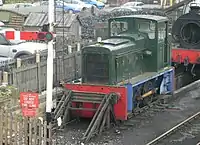 | |
| Fowler | 4100003 "H.W. Robinson | 0-4-0 | Undergoing an extensive overhaul, work involved has included fitting a replacement gearbox and a new rear wooden bufferbeam. | ||
| BR | D5600 | A1A-A1A | Class 31 | Undergoing overhaul. | .jpg.webp) |
Stored
| Origin | Number/Name | Wheel arrangement |
Class/Type | Notes | Photograph |
|---|---|---|---|---|---|
| Fowler | 4200003 | 0-4-0 | Requires extensive restoration, presently stored at Embsay. | ||
| Baguley Drewry | "The Bug/Clockwork Orange" | 0-4-0 | Requires an engine and bodywork replacement. | ||
| BR | 08054 | 0-6-0 | British Rail Class 08 | Stored out of use. | |
| BR | 31119 | A1A-A1A | Class 31 | Stored out of use. | 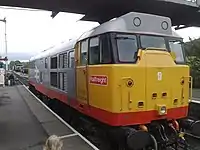 |
| BR | D1524 | Co'Co' | Class 47 | Stored out of use. | 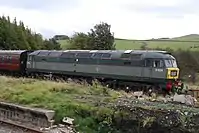 |
Railcar
| Origin | Number/Name | Class | Notes | Photograph |
|---|---|---|---|---|
| NER | 3170 | 1903 Petrol Electric Autocar | A new powertrain has been installed and tested successfully on the Great Central Railway (preserved). The autocar's restoration has been completed and is available for traffic.[9] |  |
| NER | 3453 | NER Autocoach | A driving trailer coach, dual braked to work with either the autocar or with a loco. Restoration as a loco hauled coach almost complete, driving and control equipment still to be installed. |
Vintage carriages
| Origin | Number/Name | Type | Notes | Photograph |
|---|---|---|---|---|
| GER | 14 | 6w Saloon | built in 1899. Body rebuilt in 2004 and restored to original teak livery, used regularly on the Stately Trains and carries passengers. | 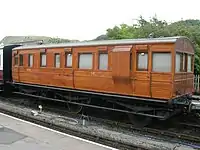 |
| GER | 8 | 6w Family Saloon | built in 1877. Currently awaiting restoration, the railway currently has the body and the underframe at the moment, in good condition so it will not have to wait much longer for its restoration to start, planned to be restored to its original teak livery. | |
| GER | 37 | 6w Family Saloon | built in 1897. Operational and used regularly on the Stately Train services, was repainted into teak livery in 2005. | 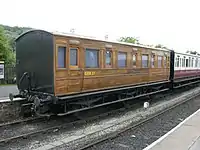 |
| MR | 238 | Corridor Third | built in 1922. The coach body is being restored and new bogies have arrived which are waiting to be fitted, planned to be restored to LMS condition eventually. | |
| MR | 241 | Corridor Third | built in 1922. Awaiting restoration, planned to be made available for service asap. | |
| GNSR | 34 | 6w Saloon | built in 1896. Operational and used regularly on the Stately Train services, painted in red and white livery, the only Scottish coach operating in England. |  |
| LYR | 1 | Directors Saloon | built in 1906. Used regularly on normal passenger trains and Stately Trains. | .jpg.webp) |
| LNWR | 1318 | Directors Saloon | built in 1913. Used regularly on normal passenger trains and Stately Trains. | |
| LSWR | 17 | Queen Victoria's Saloon | built in 1887. Restored in 2017 as part of the television series 'Great Rail Restorations with Peter Snow. |
Gallery
 Embsay Station, showing ticket office and waiting room
Embsay Station, showing ticket office and waiting room Embsay Station Building
Embsay Station Building Hunslet Austerity 0-6-0ST 'Norman' in disguise as NCB No. 69 runs round the train at Bolton Abbey
Hunslet Austerity 0-6-0ST 'Norman' in disguise as NCB No. 69 runs round the train at Bolton Abbey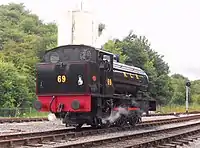 Hunslet Austerity 0-6-0ST 'Norman' in disguise as NCB No. 69 takes on water from the water tower at Bolton Abbey
Hunslet Austerity 0-6-0ST 'Norman' in disguise as NCB No. 69 takes on water from the water tower at Bolton Abbey Bolton Abbey Station Building
Bolton Abbey Station Building Class 20.189 at Bolton Abbey. 14 October 2006.
Class 20.189 at Bolton Abbey. 14 October 2006.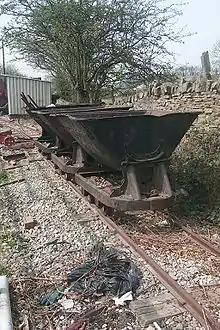 Hudson tipper wagons preserved at Embsay station
Hudson tipper wagons preserved at Embsay station
References
- "Steam railway with a future". Craven Herald. Retrieved 5 November 2015.
- "Embsay and Bolton Abbey Steam Railway chiefs put case for Skipton rail link to ministers". Craven Herald. Retrieved 4 November 2015.
- "Embsay Railway's bid to re-establish link to Skipton is still on track". Ilkley Gazette. Retrieved 4 November 2015.
- "Embsay & Bolton Abbey Steam Railway History". Archived from the original on 28 February 2008. Retrieved 22 February 2008.
- "Bolton Abbey to Addingham". Archived from the original on 17 August 2009. Retrieved 22 February 2008.
- "Formal study planned for Bolton Abbey-Skipton link". Rail (647). 30 June 2010. p. 15.
- "(Title to be confirmed)". Today's Railways UK. No. 86.
- "Emmerdale filming pictures". Archived from the original on 19 July 2011. Retrieved 22 March 2008.
- Gott, Simon. "The Autocar returns to service | The 1903 Electric Autocar Trust". Retrieved 23 November 2018.
External links
| Wikimedia Commons has media related to Embsay and Bolton Abbey Steam Railway. |